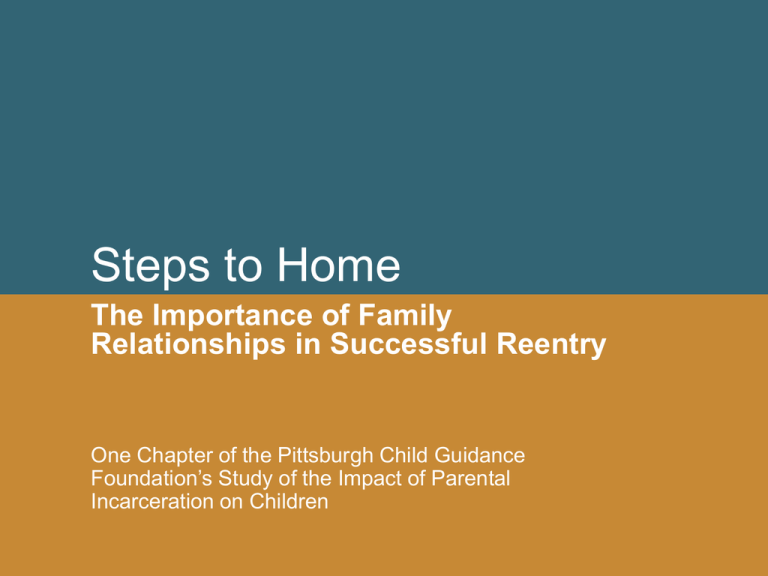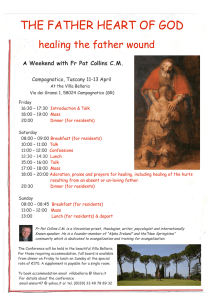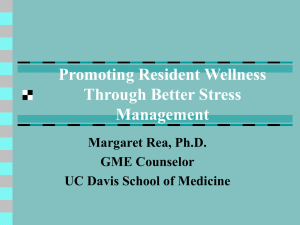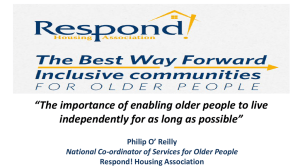
Steps to Home
The Importance of Family
Relationships in Successful Reentry
One Chapter of the Pittsburgh Child Guidance
Foundation’s Study of the Impact of Parental
Incarceration on Children
What is the role of family in
corrections and reentry?
A. Families are a nuisance and a liability.
They enable and are part of the problem.
B. Families are the primary source of stability,
support, and motivation. Without them
success is unlikely.
C. All of the above.
Families Currently Contribute
• More than $2 million a year to the Jail’s Welfare Fund
• Court clothes, and when they are lost, additional
clothes
• Care for 80%-90% of the thousands of children whose
parents are in the Jail each year
• Write, send photos, visit, & bring children
• Provide a home to go to, and powerful motivation to
stay away from drugs and crime
Research Demonstrates Positive
Impact of Family Relationships
• La Bodega- Case management and family support
brought illegal drug use down from 80% to 42%,
recidivism down 50%
• Urban Institute – Going Home Studies- Identified
family support as the most important factor keeping
offenders from returning to prison. Fathers with strong
ties to children showed lower substance use .
• Inmate Social Ties and Transition to Society- In
Florida prisons family visits – especially in month
before release - reduce and delay recidivism
Power of Relationships with
Children May Explain. . . .
• Women are twice as likely to go to jail after their
child’s placement (Allegheny County Department of Human
Services)
• Maternal criminal activity spikes and continues
to rise after child placement (ACDHS)
• 85% of arrests and 90% of maternal
incarcerations occurred after child placement (Vera
Inst. of Justice)
The Study Questions
• Round One: What happens to children in
Allegheny County when their parents are
arrested and incarcerated in the County Jail?
• Round Two: If attachments between children
and their incarcerated parents impact the
mental health and success of both, what is
happening in the Jail and reentry to support
healthy relationships?
Is There Hope?
• Many residents
– Want to learn to be in healthy relationships
– Want mediator/coach/counselor as guide
• Some parents, children, and partners of
residents never give up
Learning Relationship
Skills in Jail
PROBLEM
Relationships with Correctional Officers
From Residents and Visitors:
•
Correctional officers ARE the Jail
•
Often described as discouraging, rude,
mean, inconsistent
•
Some identified as helpful, consistent, and fair
•
Betray private information overheard at desk
(nurses, caseworkers)
•
Control access to programs,
jobs, supplies – show
favoritism
PROBLEM
Relationships with Correctional
Officers
From Correctional Officers:
• Visitors often rude and accusatory
One officer assigned to a pod responding to the
needs of 100 people leads to great stress
• Undergo “hazing” when new
•
• No
opportunity to learn positive practices from peers
• Little control over schedule
or assignment
• Frequent double shifts
lead to exhausted staff
• Not consulted about
programs, not informed
SOLUTION
Relationships with Correctional
Officers
From All:
• Training, screening, selection of officers
to match assignment
Consistent assignment
• On-going training and support
•
PROBLEM & SOLUTION
Relationships with Management
PROBLEM
• Getting
form letters
from Warden
SOLUTION
• Warden
reads
and responds
FAMILIES
• No
access to
administration
• Publicized
point person
for families
FAMILIES
• 3-11
shift not
consistent with
7-3 shift
FAMILIES, RESIDENTS,
JAIL STAFF
• Orientation,
training,
supervision of shift
commanders to assure
consistency
PROBLEM
Relationships with Other Residents
From Residents:
• Men:
most disconnected, except specialized pods
• Women:
mind each other’s business –
always on pod with nothing to do
• Women:
some positive residents initiate support
groups – end when they leave
SOLUTION
Relationships with Other Residents
From All:
• More
well run specialized pods
– Application, screening for entrance
– Consistent rules & staff
– Competent staff
– Terminate/punish individual – not group –
for infraction
– Classes and activities all the time
– Whole pod engages in activities together
– Managed jointly by program and security
• Resident-led
support groups: “morning meeting”
PROBLEM
Relationships with Case Workers
From Residents:
• Lack of time, skills, and training
• Can’t help with real problems
• No private conversations
• Women: Unresponsive, overwhelmed
From Family Members:
• Not a liaison with family members
• Most are not sources of information
• Most are unavailable
From Caseworkers:
• Role does not include family relationships
or connection to family
• Believe family work is important and wanted
SOLUTION
Relationships with Case Workers
From Residents:
• Real
counseling with privacy for serious issues
• Social
Worker on each pod
• Volunteers
to do paperwork, calls
(Chaplain’s volunteers “witness” this way)
PROBLEM & SOLUTION
Relationships with Family & Children
PROBLEM
SOLUTION
& children
lack information, fear
unknowns
•
Provide accurate information
proactively – include
residents and children
•
No model of parent role
•
Parental mentoring
•
Cut off, can’t address
issues
•
Programs including
mediation, family counseling
•
Very long stays, delays,
no information.
Especially hard on
children
•
Speed court, accurate
information to families, easy
access to attorneys,
parent and child “learn each
other” program
more and better contact visits
• Families
•
•
PROBLEM & SOLUTION
Relationships with Family & Children
PROBLEM
difficult,
expensive, often
disconnected
SOLUTION
• Phones
• Free
• Residents
• Current
• Visits
• Train,
don’t know
phone number
unpleasant,
families different,
treated same,
correctional officers
mistreated, no
accommodation for
young children
or coin phone in intake,
residents pay: programs or
work to earn phone cards,
reduce cost, guarantee
length, allow cell calls
phone books in
intake and pods
select special COs –
provide support, increase
contact visits, schedule &
child friendly rules for
families with young children
PROBLEM & SOLUTION
Relationships with Family & Children
PROBLEM
time visitors
bewildered, scolded
SOLUTION
• First
• Rules,
• Visits:
• Phone
long waits, might
not get in
• Visiting
reservations for
visits; pre-screening
areas filthy,
• Regular
expensive, slow
• Foster
unsafe
• Letters
schedules: post clearly
in lobby and pods, send info to
persons on visit lists
staff inspection (thru
child’s eyes), residents clean
letter writing program,
free envelopes for all
PROBLEM & SOLUTION
Relationships with Family & Children
PROBLEM
SOLUTION
• Letters
• Program
• Pictures:
• Clear
• Contact
• Family
between
institutions or within
Jail prohibited
mail rules
unclear; ripped during
shake downs; child
needs also
is only time
resident feels human.
Bad call or visit can
“wreck” resident/
child/significant other
for a week
for communication
between parents and their
children in institutions
rules about # of pics to
send, inform family
members, take pics of
parents/children during
visits so current & together
contact as part of
program, with pre-, during-,
and after-contact coaching
for all
SOLUTION
Experiences Birthing a Child
From Women Residents:
• Family
• If
present to coach at delivery
CO/Sheriff in delivery – female only
• Proactive
response to post-partum
depression
• Bonding
program, visits for
mothers/fathers and newborns
Special Populations
Need Special Attention
Children
• People who are indigent
• Pregnant women and new mothers
• Families in conflict and children by
several mothers/fathers
•
More than one family member
incarcerated, especially
parent/child
• People who are illiterate
•
•
Custodial fathers
(especially young)
Learning Relationship
Skills in Alternative
Housing Facilities
PROBLEM & SOLUTION
Relationships at Renewal
From Residents who are Mothers and Fathers:
PROBLEM
SOLUTION
• Court
• Revise
• No
• Family
now prohibits
home visits
family involvement
at Renewal
unpleasant
Reentry Program
at Renewal & home –
in Family Program
• Visits
• Visits
• Employers
• Build
can’t reach
Renewal staff
Court rule
employer-employee
relationship skills
PROBLEM
Relationships at Release
•
Resident may be released
in the dark, with no money,
transportation, appropriate
clothing, or place to go
•
Family/natural support
not encouraged
•
Officers/staff have limited role
•
Link to probation sometimes
not made
SOLUTION
Relationships at Release
From All:
Planned Release from “Discharge
Center” (CO)
• Family/Natural Support present
• Accompany resident to new “home”
• Home Plan part of release order
• Home Plan implementation begins
• Requirements for relationships to
family, children
• Linked to probation, education,
employment, housing, treatment,
family support
•
PROBLEM & SOLUTION
Relationships During Reintegration
From All:
PROBLEM
know what to
expect at home
(resident, family,
children)
SOLUTION
• Don’t
• Home
• Don’t
• Parental
know how to
parent, don’t know
children
plan with agreed upon
expectations, rules, roles re
family and children.
Requirements re contact with
significant others and children,
on-going updating with
mentor/counselor
mentor, counselor
begin in Jail, continue at
home
PROBLEM & SOLUTION
Relationships During Reintegration
From All:
PROBLEM
know if will
be safe
SOLUTION
• Don’t
• Home
• Need
• Begin
• Parent
• Link
• Child
• Coordinate
more preparation
for independent living
“competes” with
more interesting home
of caregiver
welfare & other
systems don’t give
parent chance or
assistance
plan=safety plan for all
(including family)
reintegration with
step-down program before
going to street or home
to family centers, other
family play areas before
leave Jail, monitor
child welfare, child
support, probation, reentry —
give parent a chance
Learning Relationship
Skills During Probation
PROBLEM & SOLUTION
Relationships During Probation
From Current & Former Residents, POs, Family:
PROBLEM
requirement of
family involvement, no
training in skills of
engaging family
SOLUTION
• No
• PO
• No
• Recognize
accommodation if
probationer/family
moves or personality
clash
linked to family or family
workers and monitor
requirements of home plan,
easier if connect with family
(PO) (La Bodega model –
family + caseworker + PO
supervise addicts)
PO - Probationer
- Family relationship as key to
reentry success, better
supervision if family on board
(PO)
PROBLEM & SOLUTION
Relationships During Probation
From Current & Former Residents, POs, Family:
PROBLEM
• Some
SOLUTION
POs work closely
with family & natural
supports, others
cannot manage the
time for family contact
• POs
– only “the
criminal side of things”
• Define
• Belief
able to manage the
multiple inputs of
probationers & family/children
assist peers – supervisory and
training positions
probation as
reentry/home plan support
and monitoring
©2010
Pittsburgh Child Guidance Foundation. All rights reserved.
Permission to use is granted with credit to Pittsburgh Child Guidance Foundation.







